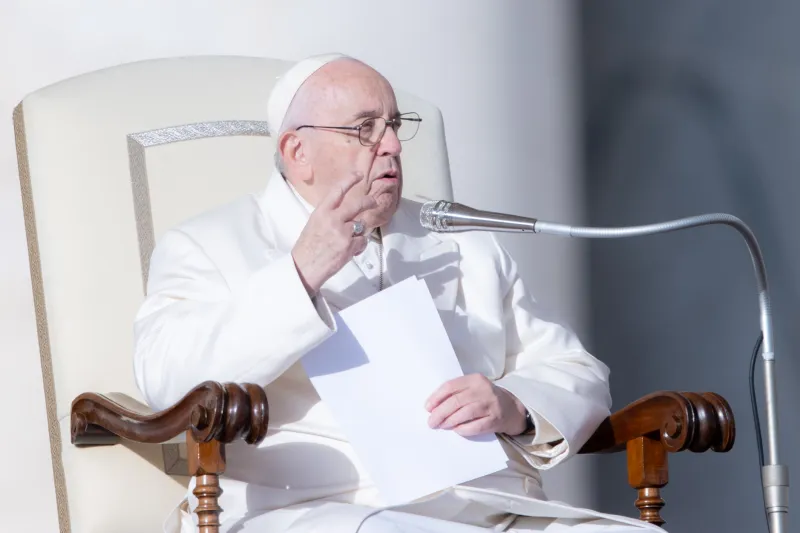
Vatican City, Oct 16, 2019 / 10:01 am (CNA).- God wills the salvation of all persons, Pope Francis said in his General Audience Wednesday, refelcting on the Acts of the Apostles.
God “wants His children to overcome all particularism in order to be open to the universality of salvation,” the pope said Oct. 16 in St. Peter’s Square.
“This is the aim: to overcome particularism and open oneself to the universality of salvation, because God wants to save everyone. Those who are reborn by water and the Spirit – the baptized – are called to come out of themselves and open themselves up to others, to live close together, in the style of living together, which transforms every interpersonal relationship into an experience of fraternity.”
He said St. Peter is “the witness of this process of ‘fraternization’ that the Spirit wants to trigger in history, citing Peter’s vision in which he was told to eat animals that were impure in Jewish law.
“With this fact, the Lord wants Peter no longer to evaluate events and people according to the categories of the pure and the impure, but to learn to go beyond, to look at the person and the intentions of his heart,” Francis said. “What makes man impure, in fact, does not come from outside but only from within, from the heart. Jesus said this clearly.”
After his vision, St. Peter preached “the crucified and risen Christ and the forgiveness of sins to whoever believes in Him” to the household of Cornelius, a gentile, and baptized there.
“This extraordinary fact – it is the first time that something of this type has happened – becomes known in Jerusalem, where the brothers, scandalized by Peter’s behaviour, harshly reproach him. Peter did something that went beyond what was usual, beyond the law, and for this reason they rebuke him,” the pope stated.
“But after the encounter with Cornelius, Peter is more free from himself and more in communion with God and with others, because he has seen God’s will in action in the Holy Spirit.”
Because of this, St. Peter can “understand that the election of Israel is not the reward for merits, but the sign of the gratuitous call to mediate the divine blessing among pagan peoples.”
For Pope Francis, St. Peter teaches “that an evangelizer cannot be an impediment to the creative work of God … but one that fosters the encounter of hearts with the Lord.”
He asked: “How do we behave with our brothers and sisters, especially with those who are not Christians? Are we impediments to the encounter with God? Do we hinder or facilitate their encounter with the Father?”
The pope concluded, saying: “Today we ask for the grace to allow ourselves to be astonished by God’s surprises, not to hinder His creativity, but to recognize and encourage the ever new ways in which the Risen One pours out His Spirit into the world and attracts hearts.”
If you value the news and views Catholic World Report provides, please consider donating to support our efforts. Your contribution will help us continue to make CWR available to all readers worldwide for free, without a subscription. Thank you for your generosity!
Click here for more information on donating to CWR. Click here to sign up for our newsletter.




Bergoglio is not a man who believes Jesus is Lord, Jesus is Savior in a true “particular” Catholic Christian sense. Period. Instead as “Lord,” Jesus “attracts” to the “creative ways” the Father saves. The Spirit is also not united in the Trinity to proclaim a “particularism”: that Jesus is unique Savior.
And this is why high probability? Bergoglio does indeed believe/proclaim God wills (“creative ways” against all “particularism”)a diversity of religions and why despite front office statements, previously by Bergoglio (like a Jesuit on parents weekend) or by his handlers, there is no reason to displease the basics of Scalfari’s take away, not precisely, all the nuances? but the basic takeaway as revealed indeed in a very very particular application/view of Jesus in the Garden of Gethsemane, a highly qualified “divine,” not that particular after all.
Aside from the signers of the Open Letter, Fr. Thomas Weinandy, OFM, Cap. is spot on. Bergoglio is head of two churches, in schism with himself as pontiff, a courageous heretic to those seeking a necessary heretic towards progress, but ultimately an apostate, an “initiate” who sees himself ushering in a new religion, and he’s quite happy about that.
[God “wants His children to overcome all particularism in order to be open to the universality of salvation,” the pope said Oct. 16 in St. Peter’s Square.]
What does that mean? And how is it verbally not a form of Pelagianism? It also sounds like a religious version of monocultural globalism.
“Today we ask for the grace to allow ourselves to be astonished by God’s surprises, not to hinder His creativity, but to recognize and encourage the ever new ways in which the Risen One pours out His Spirit into the world and attracts hearts.”
Yes, “the Risen One” “attracts hearts”…to the diversity of religions “willed by God”…”God’s surprises” according to “His creativity” even the “new ways” like Amazonian Catholicism…the syncretistic worship of Pachamama (along with Christ maybe?)…or the “suprise” of the not so new way…the Islamic “path.”
Is this not the narrative of Bergoglio, the German bishops and the majority of the Jesuits?
Is this the narrative that only a “rigid” Catholic would reject?